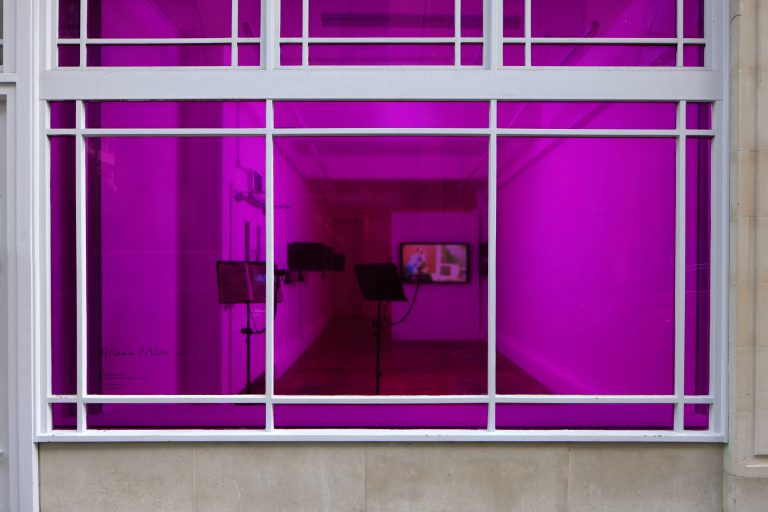Maja Čule “Electronic Witches” at Arcadia Missa, London
“Digital Witches” is a multi-channel video set up by Maja Čule comprising 9 movies. The story in Čule’s set up takes place in Nineteen Nineties Croatia following two activists—one from the USA and one from the UK—who moved to the Balkans with the target of educating girls easy methods to use Bulletin Board System (BBS) networks to ship emails. BBS networks had been prevalent earlier than the widespread use of the World Broad Internet, and key to early web activism. These activists, often called “Digital Witches,” educated girls throughout Croatia, Bosnia and Herzegovina, and Serbia about computer systems and the Web through the Yugoslav Wars.
Taken from Čule’s ongoing challenge and feature-length movie, the movies within the exhibition transfer throughout re-enacted footage of the Digital Witches workshops (video 5) and interviews with the individuals (video 3;4), discovered footage from the archive of Croatian Radio Tv (video 6), VNS Matrix’s cyber feminist manifesto (video 7) and an AI transcription of an interview with the Digital Witches themselves (video 9). In addition to 3 sculptures collating clips of glitching TV broadcasts projected on pages of Računari and VID (Croatian magazines about computer systems).
In the course of the Yugoslav wars, a few of these Western Web activists discovered their approach into the separated states to assist set up native laptop servers that enabled cross-border communication in any other case reduce up by the army state leaders. The ZaMir community (“za mir”—“for peace” in Serbo-Croatian) enabled native activists to change info and messages by connecting to the identical Bulletin Board System (BBS), which was operating on hacked dial-up networks, and will ship a message from, for instance, Kosovo to Zagreb inside a day—a velocity of connectivity unattainable in any other case.
From a non-Western perspective, the communitarian society would possibly seem as a “managed opposition,” not because of the neighborhood’s reluctance to embrace the worst end result already manifested in at the moment’s profit-driven and control-oriented Web, however as a result of the stakes had been by no means as excessive free of charge web activists in war-free Europe or North America within the first place. Čule’s present touches on this, while additionally exploring the Feminist tensions arising from the differing positions of the West and Japanese Europe.
Maja Čule’s Digital Witches is predicated on historic occasions, staged, learn and embodied by modern characters with archival footage from Croatian Radio Tv. The solid is predominantly queer, first-time actors unfamiliar with the historical past behind the Digital Witches previous to filming. Čule most well-liked to guide the individuals to discover their early web experiences from reminiscence.
Deconstructing the method even additional, the movie has been shot completely in Croatian, a language with a narrower on-line vocabulary in comparison with the Anglo-Saxon languages and in addition not the primary language of most of the individuals. This linguistic problem provides to a decidedly genuine slippage, with one display that includes an actor struggling to learn the VNS cyberfeminist manifesto in Croatian. These struggles symbolize a brand new group of womxn who gained entry to on-line networks after the autumn of Yugoslavia and the Soviet Union, highlighting the technological and linguistic divides and the emergence of recent identities.
Following the collapse of Yugoslavia, media and authorities partially regressed into patriarchy. Croatian Radio Tv was (and nonetheless is) publicly owned. Čule employs narrative methods to counter media propaganda with their very own instruments, producing different content material throughout the cultural sphere in hopes of materialisation.
Modern leftist feminist discourses in Japanese and Western Europe, whereas converging in some facets, have adopted distinct paths. In Japanese Europe, involvement on this discourse primarily started throughout third wave feminism, with out important prior waves. Regardless of communist ideology’s acknowledged dedication to gender equality, girls typically served as commodities, whether or not as employees for the State or as ideological pawns in developing a story of gender inequality within the West. The truth of individuals’s on a regular basis lives was after all very completely different.
Čule brings collectively cyberfeminism and queer politics to assemble an alternate historical past, by which these cultural roots could be reduce. Working from New York and exhibiting the piece in a London gallery (and inside a Western discourse), Čule acknowledges Japanese European womxn offering a spot for them in modern waves offeminism. They place these womxn in a world of vertigo, utilizing techniques of rewriting historical past, that are so very acquainted to post-communist identities.
On a much less native scale, in Čule’s work, web connectivity takes on a extra essential and urgent significance, dispelling the heroic Western protagonist’s triviality. Nevertheless, Čule’s historic exploration doesn’t present fast options, be it to Eurocentric historiography or political points in Croatia. As an alternative, the “optimistic anti-reason” challenges the assumed rationality of “managed opposition” by uniting with the witches in a timeless transhistorical wrestle towards oppression. Confronted with such an adversary, the Digital Witches go for a combat fueled by love, care, and expertise. They set up world connections by means of the clitoris, a direct hyperlink to the Matrix. They’re each trendy cunt and future cunt.
at Arcadia Missa, London
till December 20, 2023
Supply hyperlink








Michael tuttle says: